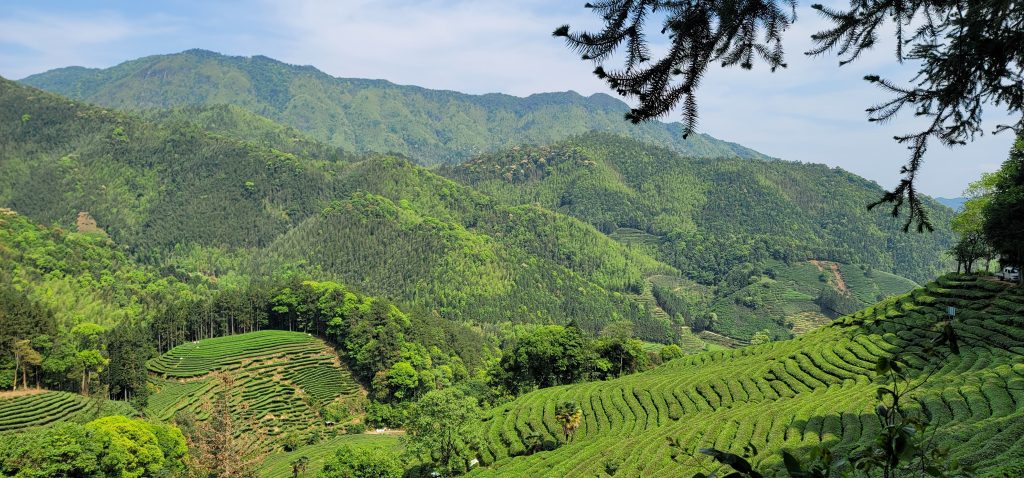$18.00 – $50.00
Silky smooth, delicate yet robust flavored Shui Xian from the hinterland Wusandi. Woody, mossy flavors with a deep, distinguished aromatic profile.
高枞 Gao Cong translates to High Bush and is the grade next to 老枞 Lao Cong Old Bush, and describes its growth pattern: allowed to grow taller and more leggy beyond its younger, tabletop-maintained plantation counterparts, the first step to becoming thicket tea. Gao Cong Shui Xian thickets are typically between 25-50 years old. While the Wusandi area is already known for its ecologically managed tea, thicket garden management ensures that the farmer remains incentivized to keep the gardens clean, as the evident growth of moss, lichens, and other "understory" plants is a selling point.
This tea experiences a roast dialed back just below a full 中火 medium roast, fixing a caramelized sugar maillard reaction and roasted almond butter aroma into the broth, slightly more roasted than its 中轻火 light-medium roasted 60 year and 100 year Shui Xian older brothers by the same producer. If possible, consider picking up all three of these teas for an exceptional educational set, as it illustrates the effect tree age has on the tea experience.
Wusandi, an ideal zhengyan alternative
Wusandi is a village close to the headwaters of the River Huangbai, the watercourse that eventually flows down to the famous Nine Bend River by Wuyishan. Of the hinterlands growing tea alternative to the hyped core scenic park teas closer to the city, along with the villages of Tongmu, Wusandi is ecologically pristine, relatively high in elevation, is water abundant, and has ideal soil for tea growing. With tea gardens growing on the slopes from 600 to over 1000 meter peaks, teas from Wusandi are often touted as the high mountain rock oolong.
Rewind to the mid-late 1600s during the late Ming / early Qing dynasties, when a general Wu Sangui revolted once he gained enough power in his assigned Yunnan and Guizhou territories and even declared himself emperor in 1678 after defending his revolt against the Manchurians of the Qing Dynasty. After dying of dysentery that same year, his grandson held power for a couple of years before being killed. Descendants of this family scattered, including 3 brothers that fled south to the safety of remote mountains in Northern Fujian. The story goes that on such a journey they were sure to bring along a rooster, as folk in those times believed that wherever a rooster crows must be a suitable place to live. At last, in a lush, bamboo forested valley, their rooster crowed for a long while, convincing the 3 brothers Wu to put down their bags. Wusandi was formed, and though the two oldest brothers eventually moved back to familiar territories as it became safer for their family, the youngest brother stayed in Wusandi and planted tea.
Today, hundreds of years later, Mr. Wu is one of the descendants of the younger brother who can trace his ancestry to the infamous Wu Sangui. Wusandi remains a tucked away mountain hamlet, and is known in connoisseur circles for having on average older Shui Xian bushes than the Wuyi scenic park which are generally about 60 years of age. Wusandi boasts around 2000 old Shui Xian bushes around 100 years old. Since these trees are old, the output is limited: each tree produces a little over 1 pound of finished tea annually.
Many specialty cultivars found in Wuyi in lower elevations are not suitable to grow in Wusandi, as the higher elevation produces late winter cold snaps that sensitive varietals can't withstand. Qidan Da Hong Pao, Rougui, and Shui Xian are more cold hearty — a major reason why they are the most widely planted cultivars in the Wuyi Mountains — and Mr. Wu only grows and produces these varietals.


a study book handwritten by Mr. Wu's grandfather for his father (there were not schools in Wusandi at the time). Mr. Wu's grandfather planted the 60 year old Shui Xian bushes and Mr. Wu's father planted the 40 year.